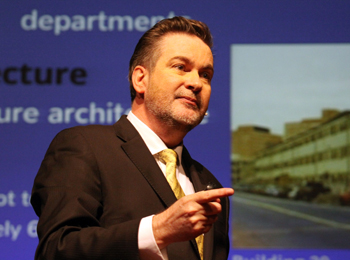Portugal Sees the Euro Crisis as an Opportunity and Not Only a Threat
[Mal Fletcher Press Interview with Canal Superior news site, Portugal]
[Published April 11, 2013 - Translated from the original Portuguese]
by
Ana Luisa Oliveira
The difficult economic environment and the rapid growth of cities are posing new challenges to political and business leaders. Innovation is the key to coping with social changes.
This is the perspective of Mal Fletcher, international consultant on leadership, who is now in Porto, for the International Conference on Leadership and Entrepreneurship, hosted by the AEP Foundation.

In an interview with Canal Superior, Fletcher, who is based in England, says that future leaders are those who can "ask the right questions", such as: "What kind of city do I, my employees and my clients want to live in 10 years from now? And what can we do now to set that in motion?"
The solution is to involve civil society and business in developing strategies directed towards both present and future needs, with new projects, products and services, explains the consultant.
Innovation and the ability to understand people are essential in a leader, he says. "Leaders should be able to engage people, by telling them not only what a company or organization does, but what it stands for. People need to know that what they are doing will make a difference," says the founder and chairman of the UK-based 2020Plus, which is dedicated to innovation in leadership and social change.
In the curve of entrepreneurship, Portugal may excel, Fletcher believes, because the country "sees the Euro crisis as an opportunity and not only as a threat." Portuguese cities and the country as a whole can "benefit from the launch of multidisciplinary competition, rewarding the most creative solutions to emerging problems, especially when the solutions involve partnerships between different sectors of business and the community", the expert advises.
Innovation must be coupled, he adds, with imagination and creativity. He cites studies conducted recently in the United States which conclude that if we are working on a complicated subject and pause to do some more imaginative activity, we will return to the problem with a 40 percent boost in productivity.
Rapid urban growth is one of the major challenges that politicians and businessmen will face. Social changes are occurring on several levels at once.
"100 cities around the world are already responsible for 30 percent of its economic growth and about 90 percent of its innovation, "says Fletcher. "In 2015, it is estimated that the majority of African people will be living in cities, and by 2030, the number of people living in cities will be 5 billion, including 60 percent of the Indian population."
Rapid urbanization brings benefits in terms of health care - such as lower costs due to volume and greater choice - and new business opportunities, but when combined with a growing reliance on technology, it can also lead to "greater isolation for people." Building a "cohesive community within society by creating a shared sense of identity" will continue to be a challenge for sociologists and politicians, says Fletcher.
The relationship between technology and the human being is, in the opinion of the international consultant, one of the biggest challenges we will face. The field of life-sciences opens up a range of "opportunities for business leaders and technologists who are willing to do what pioneers have always done. "
Medical advances that will enable people to live longer, plus genetics raise several ethical questions, including the debate about assisted death, warns Mal Fletcher. Over the next 10 to 20 years, innovation will be the key to leadership in various sectors of society, together with an understanding of ethics. The ethicist represents a key profession for the future, concludes Fletcher.
Mal Fletcher is one of the speakers at the conference taking place today in Exponor, which will include a discussion of corporate social responsibility, the role of women in society and in sport leadership, among other topics.